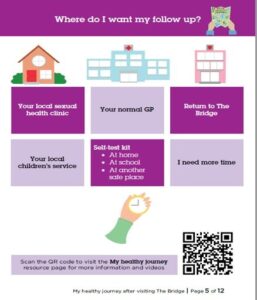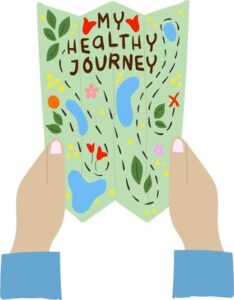By Jane Meyrick, Michelle Cutland and Rae Adams
Childhood Sexual Abuse (CSA) is increasingly recognised and the impact often lifelong. With at least 15% of girls/young women and 5% of boys/young men experiencing some form of sexual abuse before the age of 16 years the role of sexual health is crucial. Sexual Health Follow-up (SHFU) is offered by paediatric Sexual Abuse Referral Centres (SARC) but an audit by the clinical team at the Bridge, University Hospitals Bristol and Weston NHS Foundation Trust showed we could be doing better.1 in 5 were lost to follow up and young survivors and their carers found visits potentially anxiety-provoking or re-traumatising. Referring teams struggled to find an appropriate provider, especially for survivors aged under 13 who cannot attend standard sexual health clinics. Providers themselves reported feeling these consultations went beyond their day-to-day competencies.
Our paper describes how members of the clinical team supported the ‘voice group’ of survivors at the Greenhouse CSA support service, to re-design a pathway that would better meet their needs, with guidance from a health psychologist. This work was funded by research capability funding from the NHS Trust. The work did this in a way that paid attention to power dynamics – we did not invite patients into healthcare structures and processes that hoard power but went to them. We did not and start a ‘one-off’ project-based group but found the organisations that had already built a safe space for supported /safeguarded survivors. The work was transformational, not because of what we did but how we did it, focusing on restoring voice and agency to young survivors whose experiences had robbed them of both. The pictures below illustrate the trauma informed and survivor centred passport through sexual health follow up we developed (which included links to short ‘this is what it is’ videos). We designed this through arts– based, creative workshops that used evidence-based tools allowing distancing techniques for survivors to safely talk about what others might need. Data from the groups, parents and a wide range of staff was thematically analysed.
The ‘My Healthy Journey’ map produced by Dr Rachel Adams and Hope Barraclough from the Bridge, is for service users and their carers but also for clinical staff to clearly understand the pathway with a parallel professional map.
The impact for those involved was “amazing’.. really proud” and “the group were really pleased with the outcomes…especially the way that what they had said got taken in and fed back…they have repeatedly said is what makes being part of the group worthwhile” (Voice facilitator). We are currently formally evaluating the work but focusing on the principles of survivors as experts by experience, we have started by asking survivors how they would measure their own outcomes: as the Bridge Paediatric Clinical Director, Dr Michelle Cutland wisely described it, ‘capturing clouds’.
The theme of World Sexual Health Day this week is consent. This reminds sexual health of their pivotal contribution to identifying and supporting survivors of a range of violence and abuse. That means moving beyond the limited domestic violence/safeguarding framework that can dominate. Parallel work around sexual abuse is taking place with BASHH’s Sexual Violence interest group. Results from a national survey of how sexual health asks about sexual and domestic violence is currently being prepared for publication, watch this space.
About the authors
Associate Professor of Health Psychology Dr Jane Meyrick specialises in sexual health and sexual violence/abuse. She recently published an accessible overview of sexual violence in her research translation book #MeToo for Women and Men. Her work particularly focuses on the lived experience of marginalised communities in sexual health.
Dr Michelle Cutland is the Clinical Director of the Paediatric SARC at the Bridge. She is a consultant paediatrician and recent co-clinical lead for the Royal College of Paediatrics & Child Health (RCPCH) systematic review ‘The physical signs of child sexual abuse’.
Dr Rachel Adams is a senior community and reproductive health trainee in the South West.


